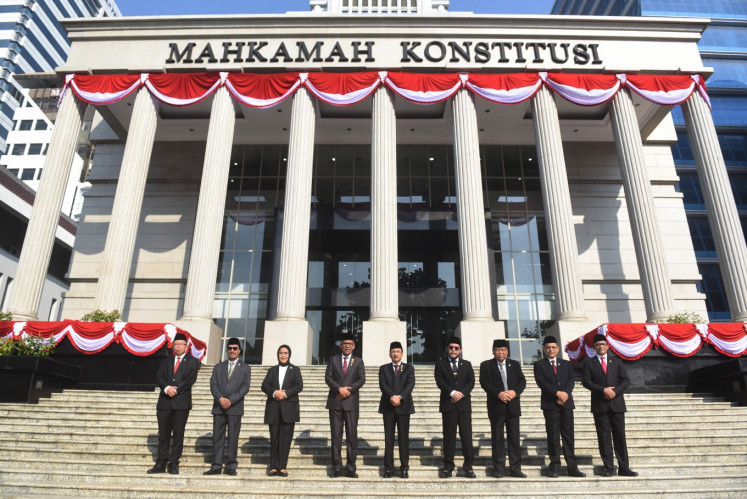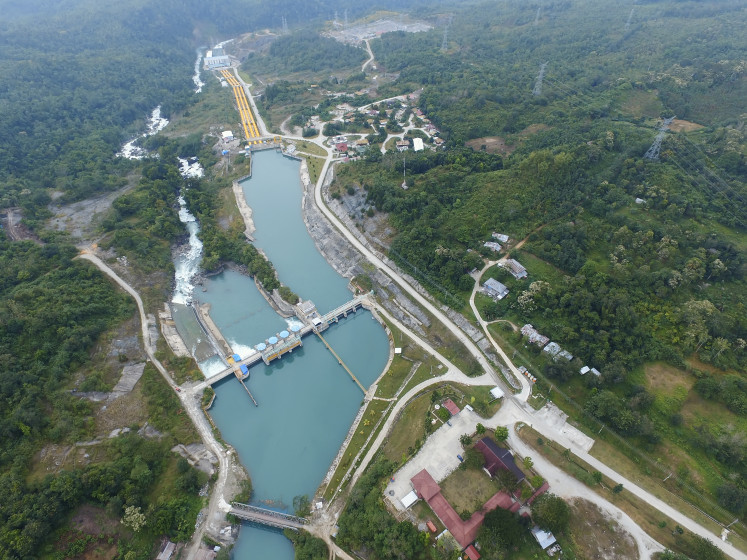Popular Reads
Top Results
Can't find what you're looking for?
View all search resultsPopular Reads
Top Results
Can't find what you're looking for?
View all search results‘Mustika Rasa’: Sukarno’s Food Legacy for Indonesia
Indonesia’s first president Sukarno once said independence comes from the tongue and Mustika Rasa gives us a taste of that freedom
Change text size
Gift Premium Articles
to Anyone

Indonesia’s first president Sukarno once said independence comes from the tongue and Mustika Rasa gives us a taste of that freedom.
The country’s first president, Sukarno, is known for many things — from his charisma, political legacy that united the country to affinity for architecture as seen in the monuments around Jakarta today.
Yet one would not necessarily associate Sukarno with food, even though stories from his closest associates paint a pretty endearing love affair between the charismatic president and his food.
“Sukarno loved Indonesian food, but he was also very particular with the things he ate,” said historian JJ Rizal.
“His reluctance to compromise when it comes to food has forced the palace cooks to come along with him during state visits overseas, even bringing along their ulekan (mortar) because Sukarno refused to eat his sambal out of a plate.”
So, it comes as no surprise for those who knew or studied him that the former president would also leave the country with another legacy in the form of Mustika Rasa, Indonesia’s first and only national cookbook.
But to call the 1,207-page book a recipe book would be a gross oversimplification.
It was a huge project at the time, and one that Sukarno took very seriously. It contained 1,300 recipes from the different regions across the archipelago, has a chapter dedicated to preventing and diminishing the dangers of a fire in the kitchen and even has a section on the different ways to make ketupat rice cake.
In fact, Rizal said this may be the only cookbook in the world that has more than one third of it consisting of text.
The book contains a number of essays from anyone connected to food back in the day — from nutritionists to architects who write about how to properly design a kitchen.
But above all, this book is an important piece of Indonesian history, written during a time when the euphoria of independence had died down, replaced with the uphill battle of uniting a vast and diverse archipelago.
This is precisely why historian, JJ Rizal decided to republish a second edition of the book under Komunitas Bambu Publishings. For him, this book is uniquely a product of its time, a perfect example of Sukarno’s Indonesian Revolution or Panca Azimat that he coined in 1965.
“Around three years ago, my friend considered himself lucky to be able to get his hands on this book for around Rp 3 million [US$225]. This book is an important piece of history that I believe people should know about — that’s the reason why I decided to re-publish it.”
To maintain the book’s authenticity, Rizal also decided to maintain the original contents of the book, including its old-Indonesian spelling and decided against fixing the many errors that he found in the recipes.
The only change he made was adding a foreword from the editor, chronicling the story of how this cookbook came about and changing the author’s name to Sukarno.

“I wanted to add Sukarno’s name on the book even though it was initially a government project because this cookbook was really the brainchild of Sukarno. I wanted people know he had left behind so much for this country, even in the form of unexpected things like a cookbook!” Rizal explained.
Mustika Rasa was a nationwide project that Sukarno undertook during the late 1950s when he realized the vital role that food can play in politics. He was struggling to unite the archipelago, and realized that food is a serious business that could become a way to promote his unity in diversity or Bhinneka Tunggal Ika campaign.
Sukarno then appointed the Council of National Planning (The predecessor to the National Development and Planning Ministry) to begin seriously planning a nationwide food program in 1960. They had invited nutritionists and village chiefs from around the country to bring forward a traditional cuisine from their village. The result was around 1,300 recipes from every corner of the Indonesian archipelago.
Rizal said after the cookbook started to find its form in 1964, Sukarno sent Hartini, one of his wives, to test out the recipes that were collected. Hartini, who was initially skeptical about the collected recipes then travelled around the country, collected ingredients and tested them out.
But when the military coup broke out in 1965, the carefully planned project was hurried to completion.
According to Rizal, Sukarno, fearing that the cookbook would never be published if he ever stepped down, pushed the book’s publication in the span of a couple of months. Despite the rush, the book was officially only published in 1967.
As a result, there are a number of noticeable errors and flaws that Rizal decided to maintain even in the re-published version of the book.
“There are actually a lot of funny errors in the book if you pay attention. For example, in the recipe Sop Djagung Pakai Tomat (corn soup with tomatoes), the main ingredients, corn and tomato was not listed in the recipe,” he said.
“They also used weird measurements so honestly, I do not know how accurate these recipes are, but I decided to keep all of the flaws of the book because it’s not only a cookbook, it’s a history book as well.”
And just like the inclusive Indonesia that Sukarno envisioned, the book also contains a number of recipes many may consider taboo today, including recipes that contain pork and pig.
“This book includes all kinds of dishes from every single region from the archipelago, even those that contain pork, blood and horse tongue. It doesn’t discriminate between the different cultures and for me, it is true reflection of the idea of unity in diversity that Sukarno envisioned for the country,” Rizal said.
And yet, despite being the only national cookbook in Indonesia, Mustika Rasa doesn’t attempt to define what Indonesian cooking really is.
“It’s really a perfect combination of a little bit of everything,” Rizal said.
In his July 1st speech, he said Sukarno said that people can’t define Indonesia — it’s a country where Marxism meets Islamism, and that’s exactly what this book is.
“You can’t define Indonesia and you can’t define Indonesian cooking but when you read it as a whole, you’ll get an understanding of Indonesian cooking is.”
— Photos courtesy of Mustika Rasa
The writer is an intern at The Jakarta Post
____________________________________________
Mustika Rasa
Author/Editor: JJ Rizal
Current Publisher: Komunitas Bambu
First Edition: Indonesian Ministry of Agriculture, 1967
Second Edition: Komunitas Bambu, June 2016
1,207 pages









